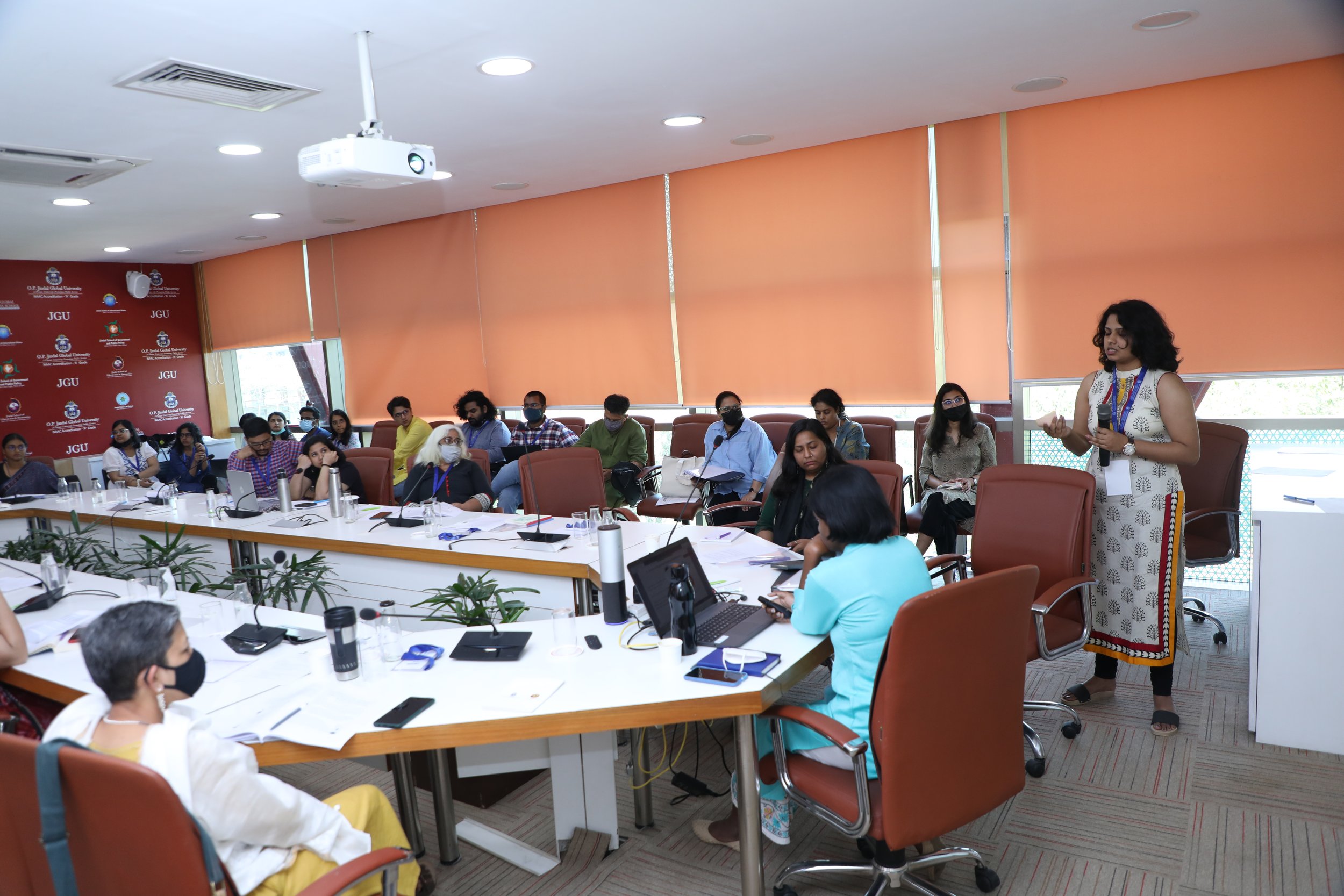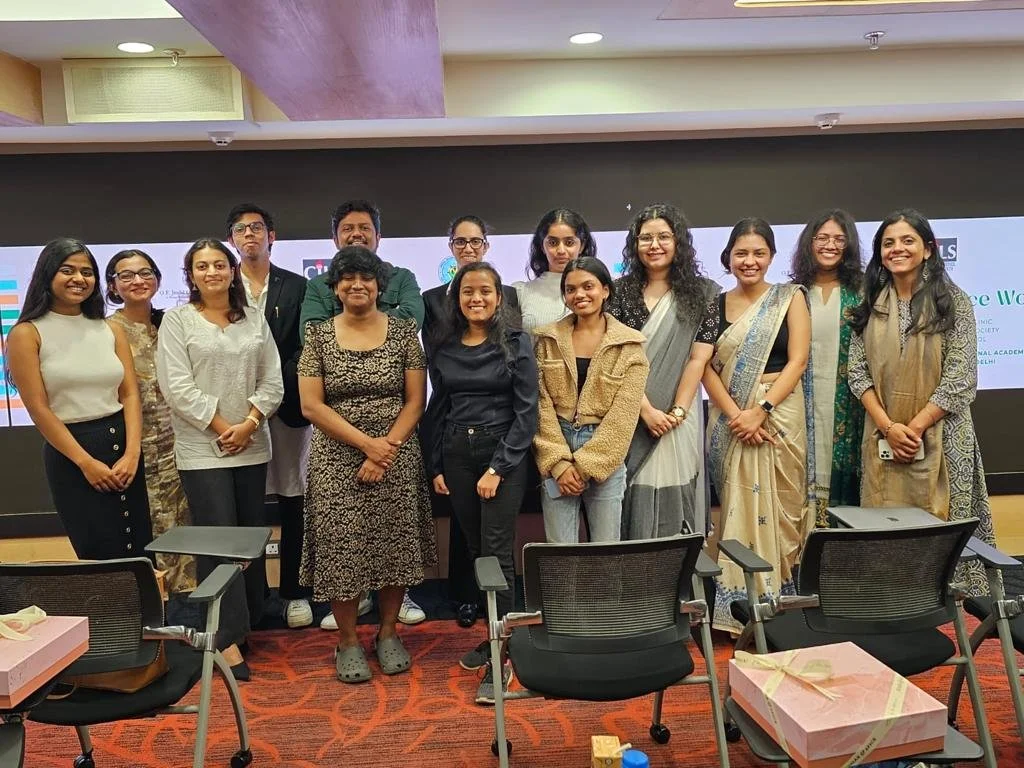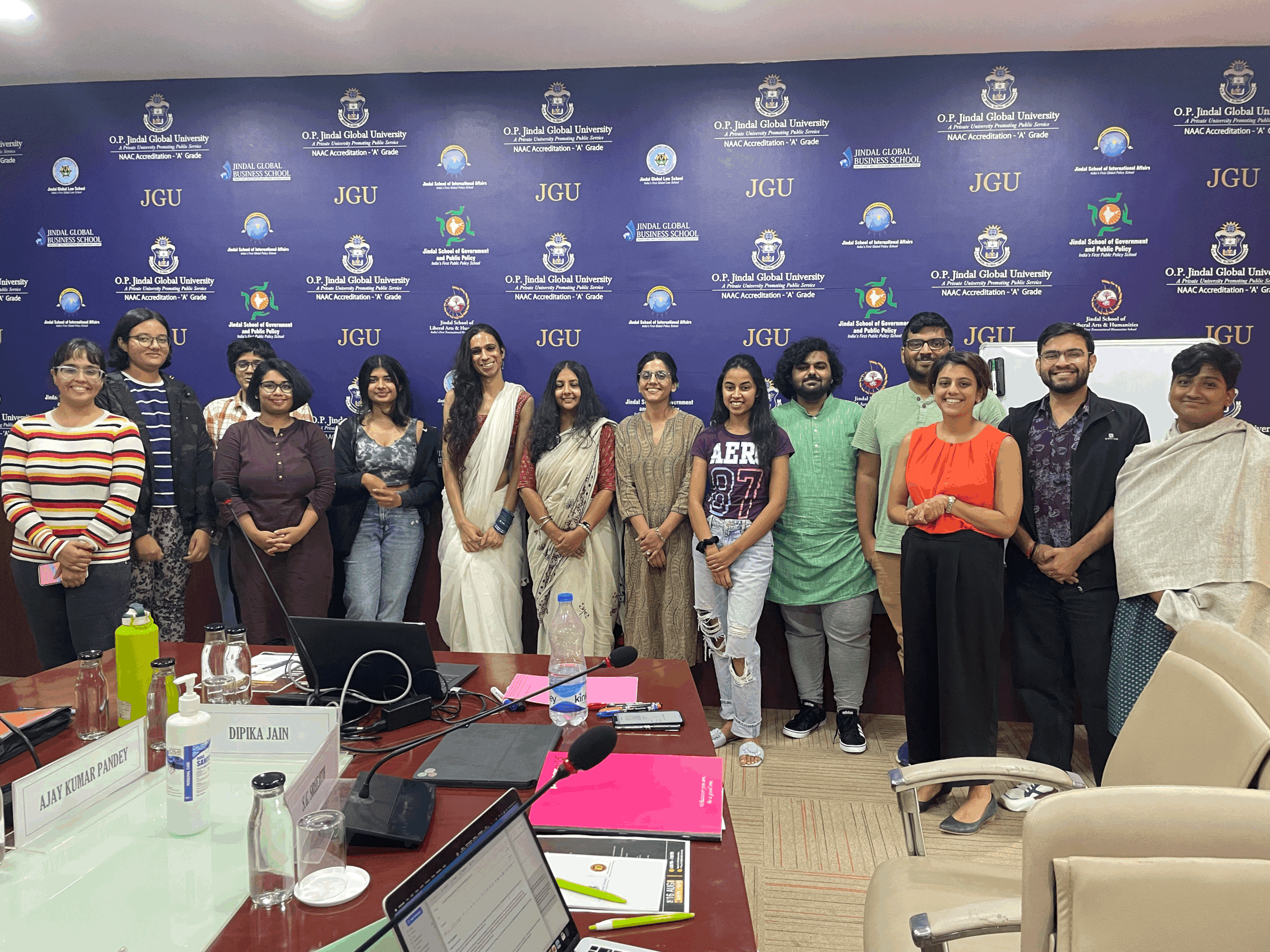
Clinical Legal Education
Clinical legal education promotes social justice by improving access to justice for the underprivileged, by introducing law students to ideas of public service responsibility and by creating an experiential understanding of the relationship between law and social justice.
Through classroom teaching and collaborative field projects, the Clinic seeks to proliferate intersectional anti-oppression discourses for comprehensively addressing marginalisation along the axes of gender, caste, indigeneity, disability, and sexuality.
Clinical courses often culminate in the publication of a resource guide, handbook or other material that will set forth research, increase legal awareness and empowerment, and provide practical and accessible advice for activists and community members.
Community engagement is imperative as it promotes reflection by students on their privileges, as well as their larger role as law students and changemakers. The community, in this regard, is the primary source of the goals of the project, keeping in mind the complexities, debates and disagreements among the members.
-

Trans Justice and the Law Clinic (2023-2024)
For the academic year 2023-24, the Law and Marginalisation Clinic, ILGA Asia, and Transmen Collective offered the Trans Justice and Law Clinic. The Clinic primarily focused on the right to cohabitation for queer persons and worked on a collaborative project with ILGA Asia and Transmen Collective on punitive laws, gender and sexuality. Students also engaged with critical scholarship on anti-discrimination laws, critical clinical legal education, constitutional law, queer politics, gender identity, critical legal theory, intersectionality, critical caste and race theory, anti-carceral politics, empathetic lawyering, drafting skills, research and writing skills.
The Clinic was a year-long commitment for eight credits along with an optional winter clinical programme for two additional credits.
-

Reproductive Justice and the Law Clinic (2023-2024)
In 2023-24, The Law and Marginalisation Clinic, CJLS, in collaboration with Hidden Pockets Collective and CommonHealth India, offered a clinical course titled Reproductive Justice and Law. The Clinic primarily focused on unpacking the politics of abortion and the contemporary developments in the global landscape of abortion laws, looking closely at the decriminalisation of abortion through Courts. The students also worked on a clinical project, developing a collaborative manual on global abortion jurisprudence within the framework of Constitutional Law and Criminal Law by looking at constitutional cases in 5 countries on Canada, Colombia, Mexico, South Korea and Thailand. Students also engaged with critical scholarship on anti-discrimination laws, critical clinical legal education, Constitutional Law, queer politics, gender identity, critical legal theory, intersectionality, critical caste and race theory, anti-carceral politics, empathetic lawyering, drafting skills, research and writing skills. The Clinic was a one semester commitment for four credits.
Learn more -

Trans Justice and the Law Clinic (2022-23)
In 2022, the Law and Marginalisation Clinic, CJLS offered the Trans Justice and the Law in collaboration with Transmen Collective and Egale Canada to provide students with an opportunity to engage with the contemporary research and writing on the recognition and rights of transgender and gender variant persons in India and globally.
This clinical course aimed to develop a comprehensive handbook on the laws and policies governing the rights of transgender and gender-variant persons.
Learn More -

Reproductive Justice & the Law Clinic (2021-22)
In 2021, CJLS launched the Reproductive Justice & Law Clinic – a pilot clinical project to bridge the gap between activism and academia and develop a project in consultation with social movements and offered a one year long clinical course on reproductive justice, gender and the law in partnership with CRR and CommonHealth. Students engaged with critical readings on feminist theory, intersectionality, and reproductive justice to have a nuanced understanding of these concepts and developed an advocacy manual on the barriers to accessing abortion services from an intersectional lens, thereby articulating theoretical learnings in a practical manner.
-
Compensation and Relief for Survivors of Violence Clinic (2020-21)
The clinic was offered in collaboration with Karwan-e-Mohabbat and Amritananda Chakravorty and focused on building essential skills for students in response to the Delhi High Court’s orders directing immediate assistance to riot victims in Delhi.
Students were trained by practitioners and CJLS faculty on laws related to compensation and subordinate legislation (such as government schemes on relief funds for victims of violence). Students also acquired first-hand experience of interviewing people in relief camps, completing and filing appropriate documents, and assisting with first information reports.
-

Gender, Law & the Difference Clinic (2017-18 and 2016-17)
In collaboration with Alliance India, Multiple Action Research Group (MARG) and the International Commission of Jurists (ICJ)
Students drafted a Handbook on Rights of Transgender and Gender Non-Conforming Persons in India, which was published in collaboration with Alliance India, Multiple Action Research Group (MARG) and the Inter- national Commission of Jurists (ICJ). The Handbook has been instrumental in creating dialogue and discourse on the status of transgender and gender non-conforming persons in India and has also equipped the community with information to advocate for their legal rights. The students subsequently published a Hindi translation of the Handbook to ensure its accessibility to Hindi-speaking persons and persons working at the grassroots level.
-

Gender and Healthcare in Haryana Clinic (2015-16)
Consistent with the core belief that the impacted community should be centered in all advocacy efforts, students in “Gender and Healthcare in Haryana Clinic” conducted interviews and consultations with ASHA workers, ANMs and healthcare professionals in Haryana and then developed a pamphlet on the rights violations and other issues faced by such healthcare workers.
This material is currently being used to develop a wide-reaching social media campaign to increase awareness on the rights of ASHA workers.
-

Criminal Justice System and the Transgender and Gender Variant People’s Clinic (2014-15)
The Criminal Justice System and the Transgender and Gender Variant People’s Clinic was conducted in collaboration with Mithra Trust and Alliance India.
The clinical course involved the empirical study of queer experiences of violence. The course was bifurcated into two parts: first, students undertook a desk review of prevailing law and policy on transgender rights in India, relevant international law material and comparative research on prison management and transgender rights and second, the clinic worked with grassroots organisations, students and faculty to interview transgender persons in Delhi on how they have been treated by the police and other state officials.
-

Gender Legal Recognition Clinic (2013-14)
Pursuant to discourse on legal gender recognition through guest lectures and writing workshops in the clinical course titled “Gender Legal Recognition Clinic”, students published a resource guide “Recent Legal Reforms on Gender Recognition: A Global Review” through the National Consultation on Human Rights of Transgender People, Hijras and Other Non-Normative Gender Groups in India in November 2013.
This resource guide was a result of collaborative knowledge production among students, faculty, as well as transgender and gender-variant persons. Since its publication, it has been used by lawyers, activists and scholars to further their advocacy efforts for the gender-variant community.
